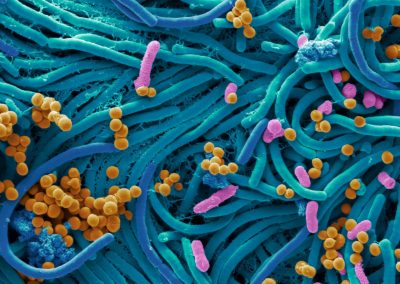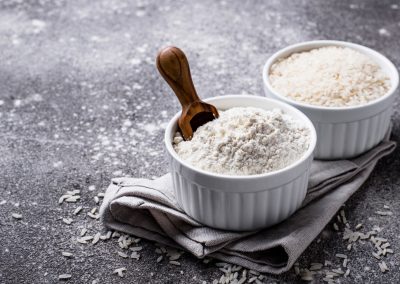Free
60mins
IMMUNITY SERIES – PART 1
NUTRITION & THE IMMUNE SYSTEM IN HEALTH & DISEASE
Dr Caroline Elizabeth Childs
IMMUNITY SERIES – PART 1
NUTRITION & THE IMMUNE SYSTEM IN HEALTH & DISEASE
Dr Caroline Elizabeth Childs
Free
60mins
Nutrition is a critical determinant of immune responses. Get up to speed with the very latest credible evidence with leading global expert Dr Caroline Childs in this three-part immunity series on MyNutriWeb
CONTENT AND LEARNING OBJECTIVES
CLEAR UNDERSTANDING OF:
- The complexity of the immune system
- The macro- and micronutrient demands of the immune system
- The role of omega-3 fatty acids in inflammation and atopic disease
BE AWARE OF:
- How immune function might best be studied in human trials
- Examples of nutrients with complex interactions between intake, status and immune function
- References for appropriate further reading
BE ABLE TO:
- Consider the hierarchy of evidence when reviewing studies of nutrients and immune function
- Reflect on the challenges of communicating nutrition advice related to immune function
Help us to continue providing expert nutrition learning
If MyNutriWeb has helped you deepen your knowledge of dietary and nutritional subjects, join us to help support and educate people to eat well for themselves and the planet. Read more...

Expert speaker
Dr Caroline Elizabeth Childs BSc (Hons) PhD RNutr
Dr Caroline Childs is Lecturer in Nutritional Sciences within Medicine at the University of Southampton.
Dr Childs research focuses on fatty acids, probiotics, and prebiotics, and their role in immune function, inflammatory status, immunosenescence and the gut microbiota. Dr Childs is currently a Member of the ILSI Europe Expert Group on Immune Competence and Co-Chair of ILSI Europe’s Nutrition, Immunity and Inflammation Task Force.
Dr Childs holds considerable expertise in flow cytometry, and led a working group responsible for the development of flow cytometry facilities at the University of Reading, and was appointed as a specialist advisor to the Food Standards Agency on the conduct and interpretation of analytical flow cytometry.
In 2018 Dr Childs received both the student-nominated SUSU Faculty of Medicine most engaging lecturer award and the staff-nominated Faculty of Medicine teaching award. Colleagues nominated Dr Childs for teaching excellence in BM5, BM6 and MSc Public Health, and for her outreach activities including inspiring school age children via LifeLab’s ‘Meet the Scientist’ sessions.
Dr Childs is an academic integrity officer for the Faculty of Medicine and member of Communications Committee of Institute of Developmental Sciences. Her external education commitments include a post as external examiner for the BSc Biology of Health and Disease at Liverpool John Moores University and visiting lecturer at the University of Hertfordshire.
Dr Childs has an active role in professional societies and is a Nutrition Society Ambassador for the University of Southampton, and is South East Regional Representative for the Association for Nutrition. Dr Childs is Associate Editor on the Editorial Board of Nutritional Immunology, a specialty of Frontiers in Immunology and Nutrition, and an Editorial Board member of The Journal of Nutrition and Nutrition Bulletin.

During the Q&A session of the live Webinar Sue Baic RD will join Dr Caroline Childs and be on hand to help answer any practical dietetic questions.
Expert panelist
Sue Baic RD
Registered Dietitian
Sue is a registered dietitian with over 25 years’ experience including in hospitals, general practice, public health, the prison service and in food banks. She spent 10 years as Senior Lecturer in Nutrition and Public Health at the University of Bristol and is co-author of the books Nutrition For Dummies and The GL Diet for Dummies. Sue feels passionately about the benefits of communicating evidence-based nutrition to the public and is a media spokesperson for the British Dietetic Association (BDA) and the Science Media Centre.
Her current work involves working with clients on low income at a Bristol charity and in workplace health.
WEBINAR HOST AND MODERATOR
Tanya Haffner, MD RD Nutrilicious.
Q&As
Vegan algae oil and supplements available providing EPA and DHA from various health food stores and online. Biocare, Spirulina, Healthspan are some of the brands mentioned as well as the fact that they are costly. Would Dr Childs like to comment on these and how they compare to oil-rich fish or fish oil-based supplements.
Vegan alternatives are very helpful for those who wish to increase their omega-3 intake without relying on fish-based products. They can vary in terms of their EPA and DHA content, and the relative ratio between them (as can all omega-3 supplements), so always worth checking the packaging details carefully.
Are there optimum doses to be consumed or side-effects of over consumption?
In terms of omega-3 fatty acid supplementation, UK recommendations are to consume 2 portions of fish per week, one of which should be oily. This equate to around 450mg of EPA + DHA day. Some studies which show beneficial effects use much higher doses, such as the average of 3.5g/day in rheumatoid arthritis studies I mentioned. The main ‘side-effect’ people tend to report with taking fish oil is ‘fishy burps’ which can put people off them completely. This can be reduced somewhat by taking capsules with a meal rather than on an empty stomach.
Would Dr Childs recommend seaweed for ALA?
Seaweed such as Nori can be a great source of iodine though can be high in salt (483mg sodium in 15g dried wakame seaweed). But for ALA I would suggest linseeds (also known as flaxseeds) or their oils. Seeds and nuts are a good source of ALA, particularly walnuts. Many other foods also contain ALA, such as avocadoes and edamame beans.
How effective is ALA conversion to EPA/DHA – what influences / enhances conversion pathway e.g. if intake or status of long-chain omega-3 is low does this upregulate the ALA to EPA/DHA conversion?
This is an interesting question and one which is a little controversial in the research field. It is broadly reported that adults have a limited ability to convert ALA to DHA, with some estimates of it suggesting it is below 1% in humans. However, the ability to convert ALA to EPA+DHA is known to vary with age, background diet, and hormonal status. I have written a few papers on this subject! It is my hypothesis that we are able to effectively upregulate EPA+DHA synthesis at the time/location it is required. In my own research for example, I found that the enzymes involved in the conversion were upregulated by progesterone, and so could ensure a supply of DHA to the developing infant brain during pregnancy.
Would a vegan be able to get the same effects from DHA/EPA algae oil or ALA in the diet? Can Dr Childs recommend suitable omega-3 food sources for vegans OR non-fish eaters.
A good question – and one which is hard to unpick. Eating fish is about more than just eating some EPA/DHA. Fish are also a source of protein, iodine and vitamin D for example. So algal oil or ALA in the diet cannot replace those (although of course there are other vegetarian sources of those nutrients).
Given that most people in the UK never eat oily fish, I suggest all of us, whether vegan or not, consider what non-fish sources of omega-3 we can include in our diet. For those who do eat oily fish, the health benefits from doing so may be further increased by substitution effects e.g. by choosing salmon over meals containing red and processed meats.
Can Dr Childs recommend suitable omega-3 food sources for vegans OR non-fish eaters and quantities to be consumed. Or do they have to rely on supplements?
You can increase your omega-3 intakes by making changes to the cooking oils you use, adding seeds and nuts to your diet, and eating green vegetables. For non-fish eaters who are not vegan, other meats such as chicken or beef also contain EPA and DHA. You might be interested to look at a public engagement ‘Omega-3 Top Trumps’ game developed by some of my colleagues in the Institute of Developmental Sciences which will be released at part of the Southampton Science and Engineering Festival this year – more details at https://www.sotsef.co.uk/.
Is there any research comparing vegan populations and oil-rich fish eating populations on immunity and related health outcomes?
These kind of population studies, known as nutritional epidemiology, are often the starting point for further research into nutrition and immune function. For example, it was Horrobin’s hypothesis in 1987 that Eskimo populations had lower incidence of heart disease, psoriasis, asthma and rheumatoid arthritis, and that that this may relate to their consumption of large quantities of oily fish. More localised historical comparisons can also be useful, for example considering what dietary factors may underlie the differences seen in asthma prevalence between children who grew up in East or West Germany. There are some natural current population comparisons which can be studied such as of Amish vs. Hutterite farming communities in the USA. To move beyond hypotheses based on observed associations, it is important to confirm effects seen using randomised controlled trials. But this is not always possible, as for example it would not be possible (or ethical) to recruit parents to a study and randomise them to follow vegan or fish-eating diets so that we could study allergic disease rates in their children.
What about the importance of vitamin D in immunity? Especially with the recent studies associating vitamin D and COVID?
Vitamin D has a role in immune function, with vitamin D receptors found on immune cells, and seasonal variations in vitamin D status linked to variations in rates of winter cold and flu like symptoms. For more detail on the role of vitamin D in immunity ad COVID, I would recommend you read the recent Nutrition Bulletin from Buttriss & Lanham-New (https://onlinelibrary.wiley.com/doi/full/10.1111/nbu.12430) which provides an excellent overview of the role of vitamin D in health.
Does Dr Childs feel the current 10mcg daily supplement recommendation sufficient or effective?
Each year since the 2016 UK government advice on vitamin D was published I have asked my undergraduate students if they know about this recommendation, and virtually none report having ever heard it before. Yet in some communities, the message was so effectively actioned by GPs that researchers planning vitamin D interventions studies struggled to identify participants who were not already taking supplements! So the effectiveness of this recommendation is currently driven at a grass roots level in my experience. It is worth noting that the current recommendations are based on levels found to be optimum for preventing rickets, osteomalacia and falls, and to benefit muscle strength and muscle function, and not on immune measures, where further research is required.
CPD CERTIFICATE & LEARNING MATERIALS
Applications for CPD approval have been made to the British Dietetic Association (BDA) and the Association for Nutrition (AfN).

Once you have viewed a full recorded webinar the mynutriweb team will review and arrange to send you your certificate via email from hello@mynutriweb.com within two weeks of viewing the webinar.
This webinar is kindly supported by the science & nutrition team at Yakult
Science has always been at the heart of the Yakult company, since the microbiologist Dr Shirota selected and cultivated L.casei Shirota in the 1930’s. Continuing this passion for science, Yakult remains at the forefront of scientific research and education, and is committed to supporting healthcare professionals in enhancing their understanding of the gut microbiota and probiotics. Yakult offers access to a variety of resources and events for healthcare professionals which can be found on their website.
Please note, approval of each sponsor and activity is carefully assessed for suitability on a case by case basis. Sponsorship does not imply any endorsement of the brand by MyNutriWeb, its organisers, its moderators or any participating healthcare professional, or their association. Sponsorship funds are reinvested into the creation and promotion of professional development opportunities on MyNutriWeb.
Popular Now

Professor Glenn Gibson: Current perspectives on gut health research: focus on prebiotics

Nutrition and Cancer Myths Debunked

Brandilyn A. Peters-Samuelson: Menopause, hormones and the gut microbiome
Feature in a Webinar
Webinar guest experts encompass topics relevant to all professionals and change agents in food and health, across all health and business sectors.
Would you like to feature in a webinar, or propose a guest expert?
Sponsor a webinar
MyNutriWeb offers organisations and brands an opportunity to sponsor topics, gaining valuable insights into the viewpoints of professionals within a moderated environment. If there is a topic that you would like to support please get in touch to discuss.
This website is intended only for students or professionals working in food, nutrition and health. If this is you, please click to continue.


